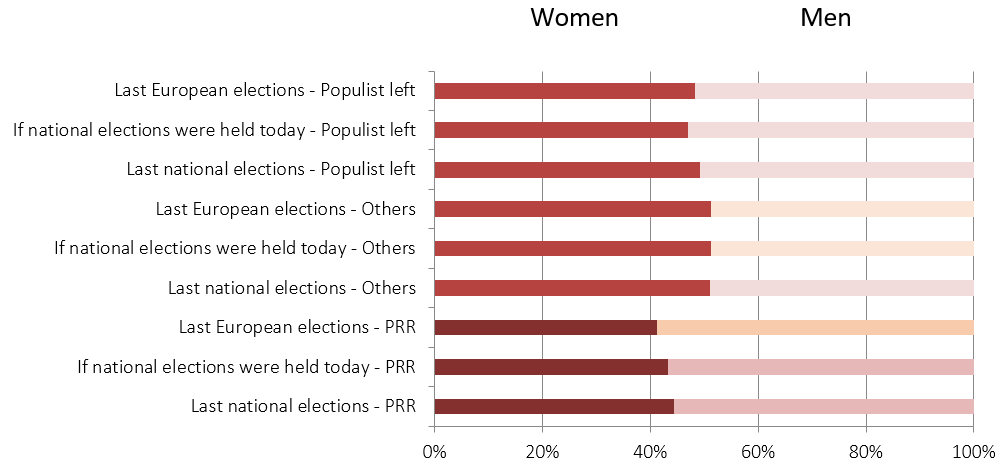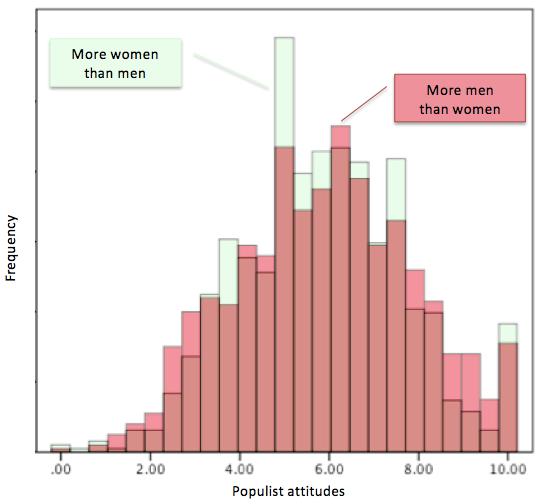The archetypal populist radical right voter is usually thought of as being male, with female voters less likely to back these parties in elections. But many of these parties have nevertheless drawn on a substantial share of support from women. Outlining results from a recent study, Niels Spierings writes that although there is a gender gap in support for populist radical right parties, focusing on their female supporters can provide a more nuanced understanding of their success.
With the Brexit referendum, the election of Trump, and major general elections in The Netherlands, France and Germany taking place in 2017, the European spotlight is once again on the populist radical right. And attention is also being focused on the people voting for populist radical right parties – particularly the men voting for these parties, as it is often stressed that they are Männerparteien. It was women who were credited with keeping the FPÖ’s Norbert Hofer from the Austrian presidency and if it had been up to their American counterparts Clinton would have been elected.
But the idea that populist radical right parties classify as Männerparteien is a partial truth at best: without women’s votes, Trump would not have been president and Geert Wilders would have only received about 8% instead of 13% of the vote in the most recent Dutch elections. The US and the Netherlands are far from exceptions in this sense.
In a recent study based on 2014 European Social Survey data across nine European countries we found that populist radical right parties draw considerably less votes from women than non-populist parties, but across the board between 40 to 45% of the vote for populist radical right parties still comes from women (see below). Similarly, in an earlier study of 2010 data we found that in each and every country, populist radical right parties had the highest or second highest male-female vote ratio; however, in the seven countries studied 40 to 45% of the votes for these parties still came from women.
Figure 1: Female and Male vote shares in Austria, Denmark, Finland, France, Germany, Greece, Italy, The Netherlands, and Spain based on 2014 ESS data

Note: For more information, see the author’s recent article in West European Politics
Why men and women vote for the populist radical right
The most pertinent questions about this gender gap are not about the gap itself, but rather the broader issue of understanding why people vote for these parties. The gender gap is a piece of that larger puzzle and by focusing on it the overly-simplistic idea of their success being rooted in the support of ‘angry white men’ can be unpacked, which is necessary for understanding why people, both men and women, do and do not vote for populist radical right parties.
Several explanations have been suggested to explain why women vote less often for these parties. Most studies find it is not linked to anti-migration stances, which clearly feed into voting for populist radical right parties, as women do not seem to be more compassionate or less anti-migration. What does make a difference is that women are less likely to work in manual labour or as small business owners. These groups tend to vote more frequently for populist radical right parties given the economic threat they experience from globalisation and economic liberalisation.
Economic and programmatic attitudes, however, focus only on one half of the ideology – the radical right – while they pay little attention to the populist part of the equation. Populism, in short, juxtaposes an intrinsically ‘good’ people against a corrupt elite. It is a worldview with an antagonistic core. As such, populism itself might be gendered as in European societies women tend to be socialised towards consensus-seeking behaviour and less aggressive communication: into being less receptive to populism.
Women are not less populist – except when they are
For the countries mentioned above, we tapped into populist attitudes by focusing on the distance between politics and the perceptions of men and women. More concretely, we combined survey items that measure political trust and efficacy, the idea that politicians care about what people think. And on these items, average women do not differ from average men – at first glance, at any rate. If we zoom in a little, the analysis shows that women are actually less likely to be strongly ‘populist’: 8% of the men and 6% of the women score 8 or higher on a ten-point scale.
For the Netherlands, more recent and precise indicators of populist attitudes are available in the SKON election study on the 2016 Ukraine treaty referendum. This survey asks, for instance, to what extent people think that political differences are larger between the elite and the people than among the people. Again, there is little difference between the mean populist score for women and men. But, also again, men turn out to be overrepresented at the extremes (see Figure 2): 19.3% of the men score 7.5 and up on a scale of 10; while only 14.6% of the women do.
Figure 2: Distribution of populist attitudes among men and women in the Netherlands 2016 based on SKON data

Note: More information can be derived from the author
Moreover, and most importantly, in our comparative study on the different European countries, we see that this worldview is a strong explanatory factor for who votes for populist radical right parties, and this is another piece of the puzzle explaining the gender gap in voting choices. Women and men might thus have roughly similar programmatic attitudes, but hold somewhat different views on conceptualising politics. Women seem on average to think less in terms of conflicting extremes or to appreciate these stances less. Consequently, populist radical right stances and forms of communication seem to appeal somewhat less to them.
Why the gender gap matters
If mainstream parties want to win back the voters that have switched to the populist radical right and ‘defeat populism’, the solution is not just moving toward the radical right, as for instance Cas Mudde has also argued in relation to the recent Dutch elections. Analyses of voter surveys indicate that a fair share of the story is that numerous people have become more populist: they think that the political elite does not represent them and is corrupt, with individuals acting against the will of the perceived homogenous people. This may be at the core of the anger many voters feel.
In itself, this general conclusion on why voters back the populist radical right is not new and it offers only a diagnosis, not a solution. But the gender lens applied in our study might help on that front. Angry white women exist, but in smaller numbers than angry white men. Therefore, a considerable number of these men must have wives and mothers who have not yet conceptualised politics as the evil they perceive it as. Mainstream politicians could reach out to these women in the ‘grey zone’ particularly, making them feel represented and pulling them back from the populist radical right. And with them, perhaps, also the men in their lives.
This post is based on the recent research article in West European Politics by Niels Spierings and Andrej Zaslove
Please read our comments policy before commenting.
Note: This article gives the views of the author, and not the position of EUROPP – European Politics and Policy, nor of the London School of Economics.
_________________________________
 Niels Spierings – Radboud University
Niels Spierings – Radboud University
Niels Spierings is Assistant Professor at Radboud University. He works on issues of inequality and participation, particularly in relation to gender, politics, and Islam.




